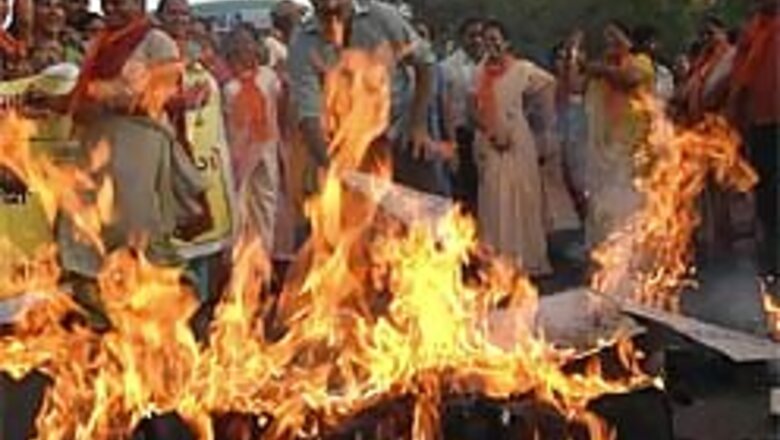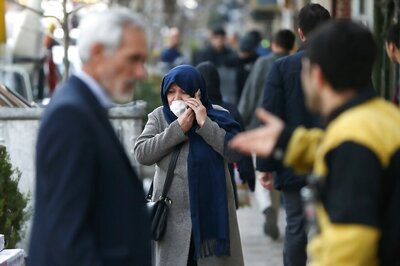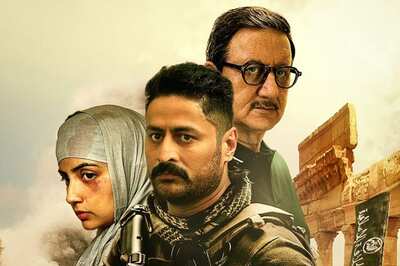
views
Alvin Toffler envisioned ‘learn, unlearn and relearn’ as the 3Rs of education for every individual in the twenty-first century. It equally well applies to nations. UNESCO, in its report on education in the twenty first century, identified ‘social cohesion and learning to live together’ as the most outstanding objectives of education. These appear to be sincere and genuine comprehensions of the existing state-of-art of the emerging human expectations and aspirations. The world suffers serious threat of violence.
The sense of insecurity pervades life and living everywhere. Everyone is unsure of tomorrow. The VVIPs of India live in a different world: those well classified categories of security covers. The aam adami pays for it but in return gets sermons and more sermons. How does the Indian state react to the latest attack on the sovereignty of the nation–blasts in the most crowded of the areas of the sate capital in Rajasthan on May 13, 2008? The file pictures of two of the innocent children killed, Dia (4 years) and Mahek (5 years) could shatter human conscience in everyone –except the inhuman amongst human beings.
History will not pardon the present generations if another Jaipur is repeated, which appears a certainty if one goes by the past experience. Sympathy, compensation, political mudslinging and VIP/VVIP visits have little meaning and create not even an assuaging impact. Government actions are routine and hardly ever translate in to empathy and action that may really give solace and a helping hand to the survivors.
Learning is not the process that is confined to schools and institutions alone or to a certain specified age group. It is all embracing and never ending for any individual, community or a nation. Did India rally learn from the terror attacks it has suffered continuously for so many years and in which invariably, innocent lives have been lost? I visited the spot of Saroijini Nagar after the October 2005 blasts. The thought that came to my mind there was: Why did we, as nation, not learn our lessons after several terrorist attacks including one on Parliament? Those who perished were there to prepare for celebrate Diwali. The terrorist played Holi in blood.
In 2006, terrorism continued unabated in Varanasi, Mumbai and Malegaon. No learning, no restructuring of the strategies to combat and crush such attacks. Samjhauta Express blast, blasts in Hyderabad in May and in August in 2007 followed by blasts in three district courts of UP. The beginning of the year 2008 saw another attack in Rampur.
Routine appreciations of the ‘spirit of resilience’ gives little solace to those who await the return of their children from schools or their breadwinners from the place of work. Every evening no one is sure of tomorrow! The terrorist strikes at their will and convenience. Why not accept this fact. Why not acknowledge that violence, fundamentalism, bigotry and religious fanaticism were never before so pronounced as of now? It does not help that it is a global phenomenon.
PAGE_BREAK
One must have the courage to set one’s own house in order. And that requires confidence and will power to act for a cause and for the country. Small poetical squabbles in times of national tragedies do not augur well for the spirit of democracy in this country. That India is the largest democracy has little meaning for the families of those who perished in the Jaipur attack. Let us not fool ourselves. We have the toughest of the problems at our hands. Severely myopic leadership, which does not even attempt to see beyond the next elections and ‘committed vote banks’, cannot solve it! After Jaipur, once again, there is ample evidence of it.
It is shocking that the announcement of the government of Rajasthan to investigate the presence of illegal Bangladeshis in Rajasthan, estimated around 50,000, has been totally politicized and communalized by the secularists. Infiltration from Bangladesh has been more or less legitimized by political parties and the secular voluntary organizations that thrive on foreign grants and aids. Certain elements are determined to criticize even the honest and timely of the actions of the Rajasthan government. Successive Central governments, NDA included, have treated the issue of Bangladeshis equally shabbily. Even the BJP governments in the states have just blinked over it. At least now a state government initiates the long due action, the political criticism piles up. Chief Minister Raje must show courage to face motivated criticism, act in the interest of the nation and not, care for the electoral consequences when matters of India’s security are at stake.
UPA government abolished POTA to fulfill a promise contained in its election manifesto. Was their rally a need to do so? If POTA was being misused, the new government could have corrected the same! Terrorists and traders of violence presented it to their young cadres as a triumph of their power and hold. Can any one prove that abolition of POTA has given any respite to the Muslim community? Yes, the Opposition did score a point. Every time a Jaipur happens, common people, irrespective of their political affiliations if any, do curse the repealing of POTA. The government must accept that the entire nation finds it’s handling of terror and violence highly inadequate. The prime minister comes out with the suggestion to establish a federal agency to tackle terrorism. When NDA had made this very suggestion, PM’s party had opposed it. People of India want the government and the opposition to sit together, consult experts and come out with a ‘national strategy to combat terrorism’. It must be implemented ruthlessly. It is the responsibility of the central government to take the first step, take opposition in confidence and be ready to accept whatever is in the national interest.
Every Indian citizen understands India is not USA. What the US has done to tackle terrorism is also not acceptable. However, why can India not be tough and severe at least on terrorist training camps in POK and handle Bangladesh government sternly? India is being rightly perceived as a soft state. A Central government that could keep national interests above party politics could have certainly acted if Pakistan had not dismantled its terrorist camps in spite of warnings. The ‘secularists’, and the central government, fail to make a distinction between terrorists and Muslims in Pakistan. It is ridiculous to equate action against terrorists as an action against Muslims. That appears to be the fear hounding the present central government. Nations with weak governments do undergo such sufferings. Solutions come from the people.
What the UPA and some well-funded voluntary organizations are up to in Rajasthan is just not acceptable to the nation. They will learn that when people go to the hustings. It may be too late by then for them.
Professor Rajput is the former chairman of the National Council for Teacher Education. He was also director of National Council of Educational Research and Training from 1999 to 2004. The views expressed in this article are personal.



















Comments
0 comment